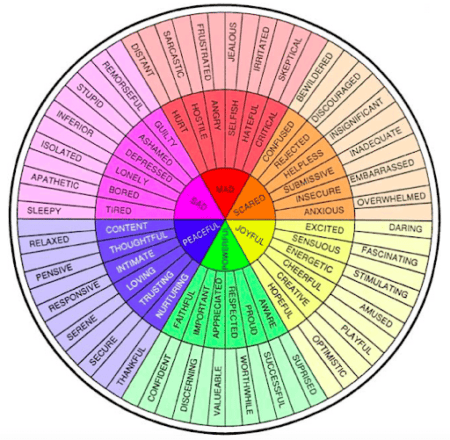
9 Tips for Having Tough Conversations
As hard as it can be, I’ve never regretted having a tough conversation. I’ve always regretted putting it off or waiting until it’s too late.
During tricky market times like these, tough conversations are swirling ALL around us. We’re hearing a lot of stories about:
- Layoffs
- Budget cuts
- The difficulties founders are experiencing when it comes to fundraising and the tough decisions that come without the much-needed investment
- Disappointed buyers
- Delayed projects
And the list goes on… it’s not an easy time to communicate!
That said, we can navigate this challenging time or any challenging situation with grace if we’re approaching these conversations with the right mindset.
So, how does that actually translate in real life?..
A Founder came my way needing to hire “the one” reeling from a pretty significant sales leadership mishire. We had three “meaty,” meaningful conversations that left both of us wanting more…
Needless to say, my heart stopped and my gut clenched when I received an email with a couple of big red flags waving at me.
They’re an international startup with some big differences when it comes to how they view compensation and equity versus the way we do, here in the US.
He wasn’t budging regardless of how much data I provided or the fact that this had something to do with his mishire.
Instead of just saying, “sure, I’ll take your business,” I opted for the white flag and requested a conversation instead.
He’s not competitive in the market and it would be more than a choppy road ahead if I were to bury my head in the sand and just take his business hoping he’d change his mind.
The first thing I said on that call was, “it’s a lot easier to talk about the hard things now and the last thing I’d ever want to do is tell you something you want to hear just to get your business.”
After all, the market will always speak loudest. Even if Founders don’t want to listen to me.
And he didn’t. We mutually agreed that we were at an impasse and that it was important for him to see what the market looked like on his own.
Fast forward 60 days later…
And a new email emerged. This time it was his white flag. He tried it his way, but he couldn’t find strong talent, he was wasting time and money, and he was ready to meaningfully engage.
He just needed time and perspective. And that’s okay.
The moral of the story is…
Tough conversations don’t have to be all doom and gloom. Even when you find yourself at odds.
Instead of avoiding these conversations like the plague, shift your perspective to see each one as an opportunity – an opportunity for both parties to take time to get clear together, find a mutual resolution to an issue, and set expectations for the future… even if that means a “no thank you” in the interim.
Tough conversations are going to happen throughout your career – and they’ll show up in many different ways. It’s simply the nature of having working relationships with other people.
It’s not always smooth sailing, and that’s OK. Some of the hardest conversations have led to the biggest lessons I’ve learned or opportunities for growth.
These 9 tips will help you make the most of any tough conversation and move through them with grace.
9 Tips to Make Hard Conversations Easier
1. Get clear
The hardest conversations are fear-based.
The best thing you can do is to understand the root of the fear.
- Are you hoping for a certain outcome and would be devastated if it didn’t come to fruition?
- Are you afraid of how they’re going to respond to what you have to say?
- Are you afraid you’ll be rejected?
- Do you absolutely hate confrontation of any kind?
Whatever the reason is, dive into it and use it as fuel to pinpoint what you WILL do versus letting it hold you back.
Ironically, the majority of our fears don’t see the light of day.
So, the more clear you are, the more in control you’ll be of what you can do to move through the fear to come out better for it on the other side.
2. Understand the story
Jumping into a tough conversation without the full picture of what’s going on is a recipe for disaster.
This is NOT the time to make assumptions. Take the time to sit down and figure out what’s going on to the best of your ability.
- What happened?
- What’s your role in the story?
- What are some things you can do to help the situation going forward?
- If the roles were reversed how do you think it would feel?
It’s critical to NOT assume bad intent. Mistakes happen and it’s always best to give someone the benefit of the doubt.
Accusing, blaming, or shaming people will only make them defensive or combative towards you… shutting them and the conversation down.
Once that happens, it’s much harder to be productive and work together to find a solution. It’s also the opposite of progress.
3. Initiate it
Tough conversations are much easier when you’re the one who takes the initiative. You know that it’s coming and can take steps to adequately prepare.
Compare this to the feeling of your CEO tapping you on the shoulder and saying, “can we talk in my office?” I can feel my heartbeat ticking a bit faster as I type it out.
Deep down, you can sense when a situation is starting to get a bit tricky. It’s much better to get ahead of the issue before it swells into a massive problem.
Seize the day, be the initiator, welcome the opportunity to talk through what’s going on, co-create a solution, and watch the magic happen.
4. Check yourself
Do NOT let your emotions take over.
We all have feelings. They’re not wrong, they’re not right. It’s what we do with them that matters. Especially when things are getting tricky. Use them as signals to know something is off.
One of my favorite ways to understand my emotions is using the Feelings Wheel. The Feelings Wheel comes in handy whenever I’m having difficulty putting my feelings into words or describing how I feel.

In a conversation, take a moment to get a sense of how you’re showing up.
- What’s your body language like?
- How have you been communicating with this person (online and in-person) leading up to the meeting?
- How is the other person/people in the conversation responding as your communicating? What is their body language?
No matter what’s going on inside, it’s important that you show up with the intention to open up to the other person and have a conversation WITH them.
Don’t go into these conversations planning to accuse, blame, or pour your anger onto someone else. I can’t stress this enough – every tough conversation is a prime opportunity to work together with someone to solve a problem.
Pointing fingers doesn’t create an environment where the other person will want to work with you.
Ask yourself, are you leaving the door open or slamming it shut? Hint, you’re going for open doors, no matter how much you want to stick it to them.
5. Check your mindset
I’m a firm believer that our mindset directly correlates to the actions we take that are tied to the outcomes we realize.
Something else to do beforehand is to take time to assess WHY you want to have this conversation in the first place.
Are you in the midst of an issue that isn’t going to resolve on its own?
If you didn’t have the conversation, what would happen? Hint: it usually gets worse…
I’ve learned this lesson the hard way and take it from me, you don’t want to wait on having the tough chat.
I find it helpful to get myself in an accountability and problem-solving mindset before I approach these conversations. It takes an open mind, an understanding that I have a part of the story too, and a willingness to hear the other person’s side of the story.
When they know that I’m aiming to come to a resolution WITH them because I care, they’re much more willing and able to work with me.
6. Set the stage
When starting conversations like this, how you frame it is key.
Don’t catch someone off guard with something that you know is going to be hard to hear (remember the CEO tapping you on the shoulder from point 3?).
If you know a conversation is going to be hard, own it upfront.
You can say something like, “I care about what we’re doing together. This is a hard conversation to have and my goal is to help with XYZ. I’d like to figure out a way where we can get through ABC together. What do you think?”
See how that sets the stage? You’re letting the other person know where you’re coming from, you’re being specific, it gives them an opportunity to prepare, and it includes them at the same time.
If you want to be heard, the best thing you can do is to hear their point of view as well. Even when you disagree, it is essential to be open-minded to hear the truth of what the other person is saying BEFORE responding.
Setting the stage helps everyone get to the root of the matter and work together to come up with a productive plan.
7. LISTEN
Listening is SO important – in every conversation, frankly.
I’m talking about listening to truly hear and understand. Not respond or defend.
.
Everyone knows the feeling of being in a conversation with someone who’s not interested in what you have to say and only wants to talk AT you. It never feels good and usually doesn’t lead to anything productive or meaningful.
An important thing to remember is that you’re not just listening to respond but to UNDERSTAND their point of view.
It’s perfectly OK to disagree with someone, but make sure you’re clear on WHY you disagree.
Then when you’re clear on it, communicate that to them. That’s where real progress is made.
I’ve said it before and I’ll say it again… people want to be seen, heard, understood, valued, and validated. This is no exception to that rule.
8. Don’t follow a script
Don’t forget that you’re having a real conversation. It’s not a rehearsed presentation or proposal.
That means you need to be prepared for things not always going how you might expect them to go.
These situations are great opportunities to embrace your humanness and honesty. People can tell when you care and they always appreciate it.
Something that helps me stay in the present moment with someone is to take notes during the meeting.
If I get that gut feeling rising that makes me want to defend myself, I’ll jot it down quickly so I can reflect later and calmly respond, instead of letting my emotions take the wheel at the moment.
There’s no set script for difficult conversations. Be yourself and be open to whatever arises once you set the stage.
Pro tip: you don’t have to say everything that’s in your head and you don’t have to be right. Sometimes the right thing to do is to keep your mouth shut, listen, and acknowledge.
9. Recap with the other person
After you wrap up, it’s always good to go over everything that happened with the other person to tie up the loose ends. This is a great “gut check” to make sure everyone’s on the same page.
First, talk about what you heard to show them that you listened and understood their story and where they’re coming from.
Then share what you need to happen going forward. Be clear here about what steps you’ll take from here, and what you’d like to see from them.
This begins the process of creating a mutual action plan together that works for everyone.
And most importantly, find a time to talk again!
After a tough conversation, it’s good to know that you’re planning to check in with each other again in the future.
That way you can keep everything on track to make sure you find a rhythm that works well for both of you while making sure the solution is truly working.
Wrapping Up
When you break it all down, tough conversations aren’t as icky as we make them out to be.
As long as you’re clear with yourself and prepared to understand the other person, with their own needs, wants, and desires, then it’s bound to be productive in one way or another.
Don’t shy away from your next tough conversation – welcome it with open arms and reap the benefits of every opportunity to grow and come out better for it on the other side.
